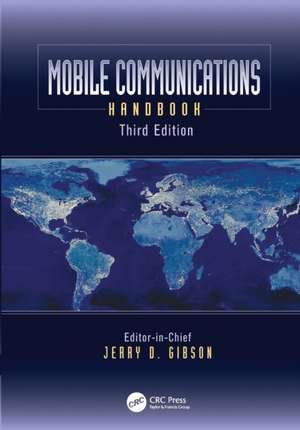Mobile Communications Handbook: The Electrical Engineering Handbook
Editat de Jerry D. Gibsonen Limba Engleză Paperback – 29 mar 2017
Illustrating the extraordinary evolution of wireless communications and networks in the last 15 years, this book is divided into five sections:
- Basic Principles provides the essential underpinnings for the wide-ranging mobile communication technologies currently in use throughout the world.
- Wireless Standards contains technical details of the standards we use every day, as well as insights into their development.
- Source Compression and Quality Assessment covers the compression techniques used to represent voice and video for transmission over mobile communications systems as well as how the delivered voice and video quality are assessed.
- Wireless Networks examines the wide range of current and developing wireless networks and wireless methodologies.
- Emerging Applications explores newly developed areas of vehicular communications and 60 GHz wireless communications.
| Toate formatele și edițiile | Preț | Express |
|---|---|---|
| Paperback (1) | 589.89 lei 6-8 săpt. | |
| CRC Press – 29 mar 2017 | 589.89 lei 6-8 săpt. | |
| Hardback (2) | 1252.76 lei 6-8 săpt. | |
| Springer Berlin, Heidelberg – apr 1999 | 1252.76 lei 6-8 săpt. | |
| CRC Press – 21 aug 2012 | 1653.27 lei 6-8 săpt. |
Din seria The Electrical Engineering Handbook
- 25%
 Preț: 895.88 lei
Preț: 895.88 lei - 25%
 Preț: 885.97 lei
Preț: 885.97 lei - 25%
 Preț: 1235.85 lei
Preț: 1235.85 lei - 28%
 Preț: 1427.12 lei
Preț: 1427.12 lei - 9%
 Preț: 1527.69 lei
Preț: 1527.69 lei - 18%
 Preț: 967.62 lei
Preț: 967.62 lei - 18%
 Preț: 1141.09 lei
Preț: 1141.09 lei - 20%
 Preț: 1643.57 lei
Preț: 1643.57 lei - 28%
 Preț: 1385.46 lei
Preț: 1385.46 lei - 27%
 Preț: 1214.54 lei
Preț: 1214.54 lei - 27%
 Preț: 1287.07 lei
Preț: 1287.07 lei - 34%
 Preț: 2029.80 lei
Preț: 2029.80 lei - 28%
 Preț: 2798.94 lei
Preț: 2798.94 lei - 26%
 Preț: 1244.90 lei
Preț: 1244.90 lei - 29%
 Preț: 1921.62 lei
Preț: 1921.62 lei
Preț: 589.89 lei
Preț vechi: 737.36 lei
-20% Nou
Puncte Express: 885
Preț estimativ în valută:
112.89€ • 117.42$ • 93.20£
112.89€ • 117.42$ • 93.20£
Carte tipărită la comandă
Livrare economică 14-28 aprilie
Preluare comenzi: 021 569.72.76
Specificații
ISBN-13: 9781138072442
ISBN-10: 1138072443
Pagini: 813
Ilustrații: 393
Dimensiuni: 178 x 254 x 41 mm
Greutate: 0.45 kg
Ediția:3
Editura: CRC Press
Colecția CRC Press
Seria The Electrical Engineering Handbook
ISBN-10: 1138072443
Pagini: 813
Ilustrații: 393
Dimensiuni: 178 x 254 x 41 mm
Greutate: 0.45 kg
Ediția:3
Editura: CRC Press
Colecția CRC Press
Seria The Electrical Engineering Handbook
Cuprins
Section I: Basic Principles
The Discrete Fourier Transform, B. Usevitch
Pulse Code Modulation, L.W. Couch II
Baseband Signaling and Pulse Shaping, M.L. Honig and M. Barton
Complex Envelope Representations for Modulated Signals, L.W. Couch II
Modulation Methods, G.L. Stüber
Error Control Coding, T.E. Fuja
Information Theory, E. Abbe, B. Rimoldi, and R. Urbanke
Rayleigh Fading Channels, B. Sklar
Channel Equalization, J.G. Proakis
Echo Cancellation, G. Cherubini
Synchronization of Communication Receivers, C.N. Georghiades and Erchin Serpedin
Pseudonoise Sequences, T. Helleseth and P. Vijay Kumar
Introduction to Spread Spectrum Systems, D. Rajan
Signal Space, R.E. Ziemer
Optimum Receivers, G.C. Orsak
MIMO Systems for Diversity and Interference Mitigation, M. Chiani
High-Throughput MIMO Systems, M.Chiani
Digital Communication System Performance, B. Sklar
Fundamental Limitations on Increasing Data Rate in Wireless Systems, D.C. Cox
Interference and Its Impact on System Capacity, B. Jabbari and Alireza Babaei
Cell Design Principles, M. Daoud Yacoub
Section II: Wireless Standards
Wireless Data, A.H. Levesque and K. Pahlavan
Third-Generation Cellular Communications: An Air Interface Overview, G.D. Mandyam
3GPP LTE/LTE-Advanced Radio Access Technologies, S. Ahmadi
IEEE 802.16m Radio Access Technology, S. Ahmadi
Land Mobile Radio and Professional Mobile Radio: Emergency First Responder Communications, J.D. Gibson
Digital Audio Broadcasting, C.-E. W. Sundberg
Section III: Source Compression and Quality Assessment
Speech Coding for Wireless Communications, J.D. Gibson
Video Compression, D.-K. Kwon, M. Budagavi, V. Sze, and W.-S. Kim
Machine Assessment of Speech Communication Quality, W.-Y. Chan and T.H. Falk
Section IV: Wireless Networks
Wireless Network Protocols, R. Mariz de Moraes and H.R. Sadjadpour
Cross-Layer Design in Wireless Communications, S. Choudhury and J.D. Gibson
Cooperative Communication Technologies, J.-S. Seo and Z. Ding
Cross-Layer Cooperative Communication in Wireless Networks, M. Nokleby, G. Middleton, and B. Aazhang
Wireless Mesh Networks, H. Lee
IP Multimedia Subsystem: Analysis of Scalability and Integration, L. N. Al-Doski, R. Ghimire, and S. Mohan
Cognitive Radio Networks, K.-C. Chen
Section V: Emerging Applications
Vehicular Communications, A. Servetti, P. Bucciol, and J.C. De Martin
60 GHz Wireless Communication, U. Madhow and S. Singh
The Discrete Fourier Transform, B. Usevitch
Pulse Code Modulation, L.W. Couch II
Baseband Signaling and Pulse Shaping, M.L. Honig and M. Barton
Complex Envelope Representations for Modulated Signals, L.W. Couch II
Modulation Methods, G.L. Stüber
Error Control Coding, T.E. Fuja
Information Theory, E. Abbe, B. Rimoldi, and R. Urbanke
Rayleigh Fading Channels, B. Sklar
Channel Equalization, J.G. Proakis
Echo Cancellation, G. Cherubini
Synchronization of Communication Receivers, C.N. Georghiades and Erchin Serpedin
Pseudonoise Sequences, T. Helleseth and P. Vijay Kumar
Introduction to Spread Spectrum Systems, D. Rajan
Signal Space, R.E. Ziemer
Optimum Receivers, G.C. Orsak
MIMO Systems for Diversity and Interference Mitigation, M. Chiani
High-Throughput MIMO Systems, M.Chiani
Digital Communication System Performance, B. Sklar
Fundamental Limitations on Increasing Data Rate in Wireless Systems, D.C. Cox
Interference and Its Impact on System Capacity, B. Jabbari and Alireza Babaei
Cell Design Principles, M. Daoud Yacoub
Section II: Wireless Standards
Wireless Data, A.H. Levesque and K. Pahlavan
Third-Generation Cellular Communications: An Air Interface Overview, G.D. Mandyam
3GPP LTE/LTE-Advanced Radio Access Technologies, S. Ahmadi
IEEE 802.16m Radio Access Technology, S. Ahmadi
Land Mobile Radio and Professional Mobile Radio: Emergency First Responder Communications, J.D. Gibson
Digital Audio Broadcasting, C.-E. W. Sundberg
Section III: Source Compression and Quality Assessment
Speech Coding for Wireless Communications, J.D. Gibson
Video Compression, D.-K. Kwon, M. Budagavi, V. Sze, and W.-S. Kim
Machine Assessment of Speech Communication Quality, W.-Y. Chan and T.H. Falk
Section IV: Wireless Networks
Wireless Network Protocols, R. Mariz de Moraes and H.R. Sadjadpour
Cross-Layer Design in Wireless Communications, S. Choudhury and J.D. Gibson
Cooperative Communication Technologies, J.-S. Seo and Z. Ding
Cross-Layer Cooperative Communication in Wireless Networks, M. Nokleby, G. Middleton, and B. Aazhang
Wireless Mesh Networks, H. Lee
IP Multimedia Subsystem: Analysis of Scalability and Integration, L. N. Al-Doski, R. Ghimire, and S. Mohan
Cognitive Radio Networks, K.-C. Chen
Section V: Emerging Applications
Vehicular Communications, A. Servetti, P. Bucciol, and J.C. De Martin
60 GHz Wireless Communication, U. Madhow and S. Singh
Notă biografică
Jerry D. Gibson is a professor and the department chair of electrical and computer engineering at the University of California, Santa Barbara. Author, co-author, and editor of numerous books, Dr. Gibson was associate editor for speech processing for the IEEE Transactions on Communications from 1981 to 1985 and an associate editor for communications for the IEEE Transactions on Information Theory from 1988 to 1991. He was president of the IEEE Information Theory Society in 1996 and served on the Board of Governors of the IT Society for 10 years. He was a member of the Speech Technical Committee of the IEEE Signal Processing Society from 1992 to 1994. Dr. Gibson served as technical program chair and founder of the 1999 IEEE Wireless Communications and Networking Conference, technical program chair of the 1997 Asilomar Conference on Signals, Systems, and Computers, and general co-chair of the 1993 IEEE International Symposium on Information Theory. He was an elected Member-at-Large on the Communications Society Board of Governors from 2005 to 2007. Currently, he serves on the Steering Committee for the Wireless Communications and Networking Conference. He was an IEEE Communications Society Distinguished Lecturer for 2007–2008, and he is a member of the IEEE Awards Committee and the IEEE Medal of Honor Committee. Dr. Gibson also received the IEEE Technical Committee on Wireless Communications Recognition Award in 2009 for contributions in the area of Wireless Communications Systems and Networks.
Recenzii
"The Mobile Communications Handbook is the most comprehensive overview of the key concepts and techniques underpinning modern wireless communication systems. The chapters are written by leading experts in the corresponding area. There is no other reference book like it available."
—Jeffrey G. Andrews, The University of Texas at Austin, USA
—Jeffrey G. Andrews, The University of Texas at Austin, USA
Descriere
This third edition reflects the latest advances in mobile communications. In particular, the text expands coverage of wireless local area networks, low-speed wireless data, and wireless ATM. The book also addresses new standards for wireless LANs and high-speed broadband, as well as for wireless mesh networks, mobile ad hoc networks, and tandem connections of digital cellular, IEEE 802.11, and IEEE 8902.16 networks. The author also covers the development of very-short-distance wireless connectivity technologies, such as Bluetooth and ultrawideband technologies, along with the rise of third- and fourth-generation digital cellular systems and wireless multimedia communications.
Caracteristici
Includes approximately 70% new, revised, or updated information from the first edition Introduces the basic principles of analog and digital communications Provides background information and technical details Covers such topics as cellular mobile radio, personal communication systems, user location and addressing, wireless data, wireless LANs, and technology standards Assesses future directions Contains independent contributions, but with intentional overlap between articles, providing essentially self-contained articles that can be read in whichever order desired by the reader








